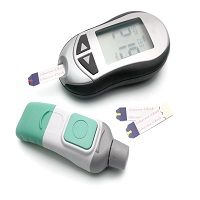Article
Type 1 Diabetes Treatment Shows Possible Cure in Animal Studies
Author(s):
Patients with type 1 diabetes could get much needed help from an unlikely source if positive results from animal model tests with a common diabetes drug can be replicated in clinical trials with humans.

Patients with type 1 diabetes could get much needed help from an unlikely source if positive results from animal model tests with a common diabetes drug can be replicated in clinical trials with humans.
Researchers at the University of Alabama at Birmingham recently published a study showing that the drug verapamil “completely reverses diabetes in animal models.” As a result of the successful animal tests the school said it plans to begin human testing in 2015.
According to the school, what will set next year’s study apart from others done in the past is that it will be “focusing on promoting specialized cells in the pancreas called beta cells, which produce insulin the body needs to control blood sugar.” Previous research has found “that higher blood sugar causes the body to overproduce a protein called TXNIP, which is increased with beta cells in response to diabetes, but had never previously been known to be important in beta cell biology.”
TXNIP, the statement pointed out, can result in beta cells dying, which makes it more difficult for the body to produce insulin. Verapamil, which can be used to treat multiple conditions including high blood pressure and irregular heartbeat, has also been shown to lower TXNIP levels in cells, “to the point that, when mouse models with established diabetes and blood sugars above 300 milligrams per deciliter were treated with verapamil, the disease was eradicated.”
“We have previously shown that verapamil can prevent diabetes and even reverse the disease in mouse models and reduce TXNIP in human islet beta cells, suggesting that it may have beneficial effects in humans as well,” Anath, Shalev, MD, the director of the schools Comprehensive Diabetes Center who served as the principal investigator, was quoted as saying in the statement. “That is a proof of concept, that by lowering TXNIP even in the context of the worst diabetes, we have beneficial effects. And all of this addresses the main underlying cause of the disease — beta cell loss.”
Shalev said with this knowledge behind them the team can work on “promoting the patient’s own beta cell mass and insulin production,” and added that “There is currently no treatment available that targets diabetes in this way.”
The UAB statement said the study will include 52 people between the ages of 19 and 45 who have all been diagnosed with type 1 diabetes within the past three months. The group will then be split, with some receiving the drug and the rest receiving placebo over the course of a year. The patients will all continue to be treated with an insulin pump during the study and will have their glucose levels monitored at all times.
“Currently, we can prescribe external insulin and other medications to lower blood sugar, but we have no way to stop the destruction of beta cells, and the disease continues to get worse,” Fernando
Ovalle, MD, a co-principal investigator and director of UAB’s Comprehensive Diabetes Clinic, said in the statement. “If verapamil works in humans, it would be a truly revolutionary development in a disease affecting more people each year to the tune of billions of dollars annually.”
Shalev also said that another area that will set the study apart from others done in the past is that the patients involved will not be taking immunosuppressive or immune modulatory medications.
“This trial is based on a well-known blood pressure medication that has been used for more than 30 years and is unlikely to have any severe side effects,” he said. “This study is also backed by a lot of strong mechanistic data in different mouse models and human islets, and we already know the mechanisms by which verapamil acts. Finally, unlike any currently available diabetes treatment, the trial targets the patient’s own natural beta cell mass and insulin production.”
He also conceded that however unlikely it may be that the treatment will cure diabetes in humans, it is a “first step” in the process.
“While in a best-case scenario, the patients would have an increase in beta cells to the point that they produce enough insulin and no longer require any insulin injections — thereby representing a total cure – this is extremely unlikely to happen in the current trial, especially given its short duration of only one year.”
Still, he said the team is optimistic about the final results. “We know from previous large clinical studies that even a small amount of the patient’s own remaining beta cell mass has major beneficial outcomes and reduces complications,” he said. “That’s probably because even a little bit of our body’s own beta cells can respond much more adequately to very fine fluctuations in our blood sugar — much more than we can ever do with injections or even sophisticated insulin pumps.”
The study is funded by the Juvenile Diabetes Research Foundation and Andrew Rakeman, the foundation’s director of Discovery Research called the work a “first step” towards finding a potential cure for type 1 diabetes. “This study represents the result of years of investment in basic research at JDRF. We are now at the stage of translating basic laboratory research into potential significant new therapies for type 1 diabetes and we’re excited to support Dr. Shalev’s team to test this concept in a study of people with type 1 diabetes.”
If the human studies are as successful as the animal trials, Rakeman added, “Finding a therapy to improve beta cell survival and functioning would put JDRF’s efforts to find a cure on a new trajectory.”





